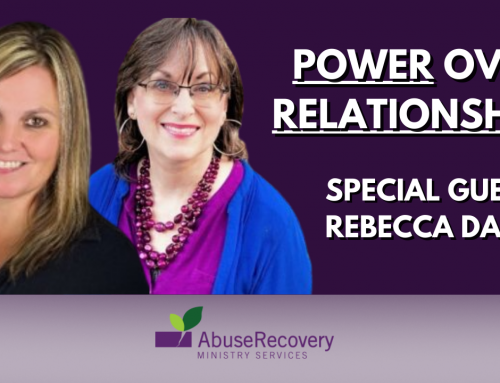There is no greater joy than walking the path we were meant to walk and for many of us, that path is one of helping others survive and thrive in their lives. To live well and then to follow whatever path God is also leading them to walk. Here is what you should know whether you are helping one survivor or many survivors.
Helping a Survivor
You must believe them, no matter how strange their story sounds. I once had a gal tell me she was kidnapped from a parking lot by men she knew previously who tied her up in a cabin for three days. The details she shared were odd and misconstrued. It takes a tremendous amount of courage to share these stories and they may fear that you will not believe them. Or they may fear you will respond negatively.
What to do: Be the light. The first step to healing is being heard and validated. So listen to them. Tell them how sorry you are that they experienced that and ensure them that abuse is never their fault.
They will not leave or make moves to say ‘no’ to abuse until they are ready to do so. Sometimes we work very hard to convince people that they are unsafe or that they are best removed from their abuser. We passionately want them to understand that there is a better life after abuse. That they can make choices to positively change their lives, as well as the lives of other family members.
What to do: Be there to listen to them, pray for them and encourage them. If they are a female abuse survivor over the age of 14, recommend Her Journey to them for abuse recovery. If you are a female as well, you can encourage them by attending the first class with them.
A Survivor Receives Encouragement to Stay
They have likely been influenced by others to stay in their situation. Often, survivors have attempted to leave, only to become afraid and return. They may have had well-meaning people share with them that they should be patient, give their partner or abuser some grace. She or he have likely had counseling recommended, and to try and repair things. Your survivor may also have a background of growing up in abuse and unable to recognize the seriousness of what they are experiencing.
What to do: Explain that abuse is a cycle. Even if their abuser is in a “kind” portion of the cycle, times of abuse will not only happen again but will escalate. The abuser is using kindness to manipulate and confuse them. And, the longer one is in abuse, the shorter that “kind” portion of the cycle becomes-sometimes disappearing entirely.
They are scared. Your survivor likely has some very real fears. Fear of change, even if they know the change is for the best. A fear of not being able to make it without their abuser. Fear of retaliation from their abuser. Fear of losing their children if they make a move. These are only some of the fears your mentee likely feels.
What to do: Understand that their abuser has spent years encouraging this fear as it gives them the upper hand. You cannot talk survivors out of their fear, but you can explain this to them. Try phrases such as “I understand that ___ has told you that you can’t make it without him” and “I suspect that ____ has told you that they would keep the kids if you try to leave?” Use phrases to indicate that it was the abuser being manipulative and not the truth. Encourage them that they are capable and that you will help them find the resources that they need.
The Survivor Thinks Abuse is Their Own Fault
They feel powerless. The abuser has also likely spent years encouraging the survivor to feel helpless and unable to make and stick with good decisions. This is another way of keeping control of the relationship. Along with fear, your survivor may feel unable to even consider any decisions or new choices.
What to do: Continual encouragement that they are capable, and that God has given them a sound mind (2 Timothy 1:7) is essential. Do not make decisions for them as this just enforces their feelings of being incapable.
They feel stuck. Often, a survivor has in the past made moves to leave abuse, but it has not worked out. I have a good friend hesitant to leave because she tried but couldn’t make it on her own financially and returned to her abuser. She has the resources now, but the fear is still too great.
What to do: Assure your survivor that they always have choices. What you may find is that your survivor may not like the choices that they have. One of our questions we ask here at ARMS is “do you still want to be living this way in five years?” When they say no, we ask them what choices will they make today to ensure that it doesn’t happen?
A Survivor Feels Stuck
They believe the abuse is their fault. The abuser has also done his or her best to convince your survivor that the abuse is all the victim’s fault. They use statements such as:
*If you hadn’t have done that, I wouldn’t have reacted that way.
*If you were better at this (activity), I wouldn’t get so mad at you.
*My days are fine until I get home to you.
*You are the problem with our relationship, not me.
*You make it hard to love you.
What to do: Share with the victim that abusers blame others so they don’t have to deal with their issues. It is wrong of them and abuse is never the survivor’s fault. Abuse is a choice that the abuser is making.
Enable Them, Don’t Rescue Survivors
They may be experiencing mental health issues. If someone is deeply depressed or anxious, not making sense, hurting themselves or constantly escalating in their emotions as you talk to them, they may be struggling with their mental health due to their trauma.
What to do: Listen as you can, always remembering to take care of yourself as well. Recommend counseling, someone who understands domestic violence (VERY important). If they are speaking of hurting themselves or other people, provide a resource such as the National Domestic Violence Hotline at 800-799-SAFE (7233) or the National Suicide Hotline at 800-273-8255. You can also call those resources for advice on helping your survivor. Understand that they may not be able to make progress in their situation right now and work on being okay with that.
You must enable them to help themselves-versus rescuing them from their situation. When we swoop in and rescue someone, it hurts all involved. They are very likely to return to their situation if they were influenced in leaving. As caregivers, our hearts can be broken in the process. It’s easy to become burned out when we care too much and they continue to make decisions that put them back into abuse.
What to do: Provide resources for them but do not make contacts for them unless they absolutely cannot do so and ask you to. Some cases of when you might need to help more are if they are constantly monitored by their abuser (phone, online or in person). Or if they have a disability and are unable to contact the needed resources.
The Relationship With Your Survivor Is A See-Saw
They may not leave. But they might. The see-saw of your relationship with a survivor is real. Many have helped someone leave and be safe, only to have them return. The abuser works very hard to make the victim dependent on him and convince them that they are unable to make it without the abuser’s support, financially or emotionally.
What to do: Guard your heart. Set boundaries so that you are not emotionally pulled back and forth as your survivor works out these issues. Yes, you will always care, but you must leave the result in God’s hands and not become discouraged or sad if your survivor chooses to not get help. Of course, never give up. It often takes years and multiple tries for someone to leave an abusive situation. Just because they aren’t making a move now does not mean they will stay forever. You’ve been an important seed planter. Others will come along and water that same seed.
“I am sure of this, that he who started a good work in you will carry it on to completion until the day of Christ Jesus.”
Philippians 1:6










Amazing Article thank you for sharing
Thank you for reading and commenting, Lisa! Glad that it was helpful to you. Feel free to pass it on.
This is the best article I’ve read on helping someone who is in an abusive relationship. Thank you Julie, you are very wise. Carla Ashton, Soul Restoration Ministries.
Thank you for reading, Carla. And also for your support. We so appreciate all that you do!!!
I agree with you that it is extremely important to recommend that survivors see a counselor that understands domestic violence well. I think that it would also be smart to suggest that they find a service to help them recognize the exact situation they are in. All of your tips for helping domestic violence survivors were extremely helpful, Julie.
Hi Charlotte! Thank you so much for reading. We will check your site out. You are absolutely right-I always assume that people will know they can give us a call for that but I should not assume. For all reading, we are here to assist you to help determine if your relationship is abusive. Also, see this chart of abusive behaviors here. Thanks again for reading and commenting.
This is some really good information, very informative and beneficial to all the readers. I was able to gain plenty of information. Great work.
Thanks for reading!
Great information!
Great blog, I am glad you come up sharing this article, the content is indeed informative and beneficial. I found this worth reading
Thank you for reading and for the recent contact with your great organization! We support what you are working hard to provide!
Great read, thank you !
Everything is clear to me now after reading this article, thank you for sharing this, I was able to gain a lot of information. Great work.
You are welcome!
I could say that I love this article because I agree with the content of this blog. It is interesting and informative. Worth reading.
Thank you for this information. The content is useful and informative.
You are welcome! We are grateful for you and your organization!
This is an awesome topic and an eye opener, well explained. Thanks so much to ARMS fraternity.
I am an abuse surivivor. I have found your website very helpful, but I could not possibly disagree more with the part on here about enabling vs rescuing. I was in a loooong 27 year marriage. When I finally got away I was exhausted and fearful beyond belief. Everywhere I went for help, they just gave me lists of phone numbers to call. I called the phone number, and more lists of phone numbers. I would go on websites, and they would direct me to other websites. I was worn out. I needed someone to do the work for me. I needed someone to sit down with me and help me make the phone calls for help with housing, food, ect. I literally couldn’t do it on my own. I was paralyzed with fear and exhaustion. I had been fighting to stay alive for years, and I needed someone to just come hold my hand and say they would help me out and that I was finally safe. I NEEDED rescued before I could go on. I NEEDED someone to HELP me find safe housing, help me with legal aid, help me with finding a job and so on. Sometimes people do need rescued, and it is not enabling. Once the fear begins to subside, and you then begin to feel safety and loved, then they are able to make it on their own.
Very sorry for your experience. It is a common one. That is why we answer the phones here at ARMS. We are certainly available when some people need more help than other people. Trauma brain is real. But we do not recommend (for instance), showing up at someone’s house and telling them to come with you in order to be safe and we DO recommend in the process of helping, that we empower them as much as possible and help build their confidence. They’ve had years of someone else controlling them at this point. Our job is to walk alongside and help them realize that they can make good decisions. Yes, there are ways to help that are more in-depth than others, as needed. For instance, as advocates we might say something like, “It sounds like you might be looking for some safe shelter. Can I share some resources with you?” Or, “Here are your options. Let’s talk about each one. What would you think about trying this or that?” In that way, we are still giving them choices, yet enough guidance that they have something to grasp onto, versus feeling overwhelmed. We can tell usually as advocates, when more help is needed, and that is OK. I had one advocate I know of who did hand out the phone numbers then specifically said “now if you can’t get a hold of people, come back on Tuesday and we will sit together and make those connections.” I thought that was a great way to handle it so our person didn’t feel so alone in their efforts to reach out and security in knowing the backup plan.